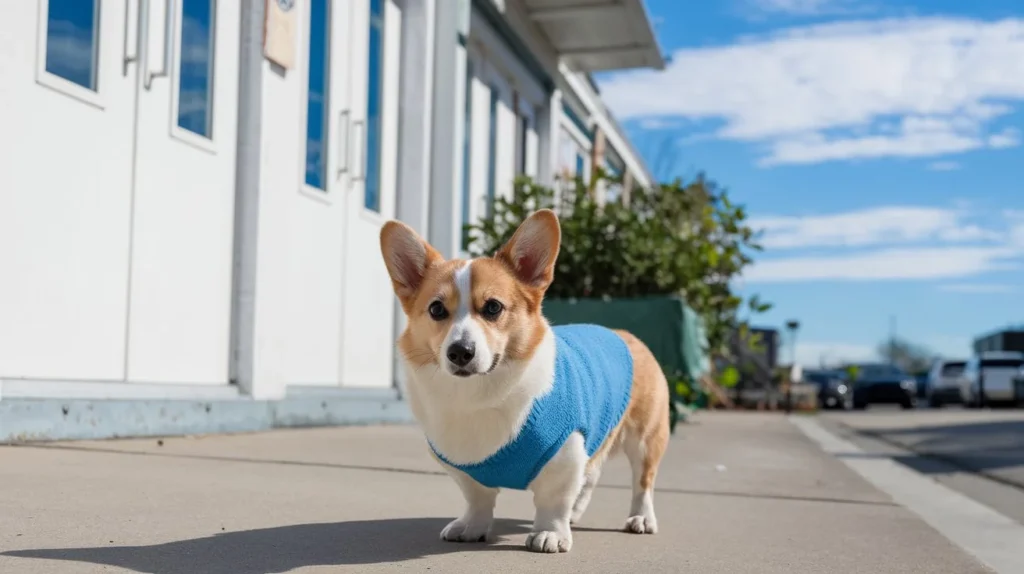Are you fascinated by the adorable corgi cane? If so, you’re not alone. These charming dogs have captured the hearts of many dog lovers worldwide. In this comprehensive guide, we’ll explore everything you need to know about the corgi cane, including its origins, characteristics, and care requirements. From the cane corgi cardigan to the cane welsh corgi, we’ll cover all aspects of this delightful canine companion.

Unveiling the Origins of the Corgi Cane
A Fascinating Journey: The History of the Cane Welsh Corgi
The corgi cane, also known as the cane welsh corgi, has a rich history dating back centuries. These affectionate canines were initially developed in Wales to serve as herders for cattle and sheep. Interestingly, the word “corgi” comes from the Welsh words “cor” meaning dwarf and “gi” meaning dog, aptly describing their short stature.
First of all, it is relevant to mention that Welsh Corgis represent two breeds: Pembroke Welsh Corgi and Cardigan Welsh Corgi. Though they both possess a lot of similar features, they differ in some respects regarding appearance and temper.
The Cane Corgi Cardigan: A Closer Look at This Unique Breed
The Cardigan Welsh Corgi, often referred to simply as the Cardigan, is the older of the two corgi breeds. These dogs are easily distinguishable by their long, fox-like tail and larger, more rounded ears. Notably, Cardigans are known for their intelligence, loyalty, and adaptability, making them excellent family pets and working dogs.
Dispelling Myths: The Truth About the Cane Corso Corgi
It’s crucial to address a common misconception: there’s no such thing as a “cane corso corgi” breed. This phrase probably originated from a mix-up between the Italian Cane Corso and the Welsh Corgi. Although both breeds are cherished, they are distinct from one another and possess significantly different traits.
Physical Characteristics of the Corgi Cane: A Distinctive Appearance
Size and Stature: Compact Yet Powerful
Corgi canes are recognized for their unique look, characterized by:
- Height: 10-12 inches at the shoulder
- Weight: 25-38 pounds
- Body: Long and low to the ground
- Legs: Short but sturdy
Coat and Colors: A Rainbow of Possibilities
The corgi cane boasts a double coat that’s weather-resistant and comes in various colors:
- Outer coat: Medium length, straight or slightly wavy
- Undercoat: Short, thick, and soft
- Colors: Various, including red, sable, fawn, black and tan, and brindle
Facial Features: The Adorable Corgi Expression
Corgis possess delightful facial characteristics that enhance their appeal:
- Eyes: Large and expressive
- Ears: Erect and proportionate to the head
- Muzzle: Fox-like and medium in length
Temperament and Personality Traits: What to Expect from Your Corgi Cane
Intelligence and Trainability: A Smart Cookie Indeed
Corgi canes are well-known for their cleverness and their strong desire to make their owners happy. Consequently, this blend of traits renders them exceptionally trainable and ideal for a range of activities:
- Obedience training
- Agility courses
- Herding trials
- Therapy work
Their quick wit and problem-solving skills often surprise owners, making training sessions both productive and enjoyable.
Social Nature: A Friend to All
These dogs are naturally social creatures, thriving on human companionship. Generally, they get along well with:
- Family members of all ages
- Other dogs (with proper socialization)
- Cats and other pets (when introduced early)
However, it’s worth noting that their herding instincts may lead them to nip at heels, especially with children. Fortunately, early training can help curb this behavior.
Energy Levels and Exercise Needs: Small but Mighty
Although they are small in stature, corgi canes possess moderate to high energy levels. As a result, they need consistent exercise to support their physical and mental health:
- Daily walks (30-60 minutes)
- Playtime in a secure yard
- Interactive toys and puzzles
- Swimming (if they enjoy water)
Participating in these activities not only helps them stay physically healthy but also mitigates behavioral problems caused by boredom.

Health Considerations for the Corgi Cane: Keeping Your Pup in Top Shape
Common Health Issues: What to Watch For
Similar to all breeds, corgi canes are susceptible to specific health issues:
- Hip dysplasia
- Intervertebral disc disease (IVDD)
- Progressive retinal atrophy (PRA)
- Von Willebrand’s disease
- Degenerative myelopathy
Routine veterinary check-ups can assist in identifying and addressing these concerns at an early stage.
Maintaining a Healthy Weight: A Crucial Aspect of Corgi Care
Because of their elongated and low-to-the-ground body shape, corgi canes are prone to gaining weight readily. Sadly, obesity can exacerbate health issues and lead to further deterioration of their spine and joints. To maintain your corgi cane at a healthy weight:
- Measure food portions carefully
- Limit treats and table scraps
- Provide regular exercise
- Monitor weight and adjust diet as needed
Grooming Requirements: Keeping Your Cane Corgi Looking Sharp
The corgi cane’s double coat needs consistent grooming to remain healthy and easy to maintain :
- Brush 2-3 times a week (daily during shedding seasons)
- Bathe every 6-8 weeks or as needed
- Trim nails regularly
- Clean ears weekly
- Brush teeth daily or use dental chews
Adequate grooming not only ensures your corgi cane looks its finest but also enables you to inspect for any skin problems or irregularities.
The Corgi Cane as a Family Pet: A Perfect Addition to Your Home
Compatibility with Kids : A Gentle Giant in a Small Package
Corgi canes can make excellent family pets, especially when raised with children. Their lively spirit and kind temperament make them wonderful companions for children. However, it’s essential to:
- Supervise interactions between young children and the dog
- Educate children on how to appropriately interact with and show respect for the dog.
- Keep in mind the corgi’s herding instincts, which could result in nipping behavior.
Adaptability to Living Spaces: From Apartments to Farmhouses
Despite their energetic nature, corgi canes can adapt well to various living situations:
- Apartments (with sufficient exercise)
- Suburban homes
- Rural properties
Their petite size makes them well-suited for smaller living spaces; however, they still need regular outdoor exercise, no matter the environment.
Interaction with Other Pets: Playing Well with Others
When properly socialized, corgi canes can coexist harmoniously with other pets:
- They often get along well with other dogs
- Can learn to live peacefully with cats
- May have a strong prey drive towards smaller animals (e.g., rabbits, hamsters)
Early and consistent socialization is key to ensuring your corgi cane interacts positively with other animals in the household.
Training Your Corgi Cane: Unlocking Their Full Potential
Basic Obedience Training: Building a Strong Foundation
Starting with basic obedience training is crucial for a well-behaved corgi cane:
- Sit and stay commands
- Come when called
- Leash training
- Crate training
- House training
Consistency and positive reinforcement are essential for successful training outcomes.
Advanced Training and Activities: Challenging Your Clever Canine
Once your corgi cane masters the basics, you can explore more advanced training options:
- Agility courses
- Flyball
- Competitive obedience
- Tricks and commands
- Scent work
Engaging in these activities offers mental stimulation and enhances the connection between you and your dog.
Addressing Common Behavioral Issues: Nipping Problems in the Bud
Some behavioral issues that may arise with corgi canes include:
- Excessive barking
- Nipping or herding behavior
- Resource guarding
- Separation anxiety
Early intervention and professional training can help manage these behaviors effectively.
Nutrition and Feeding Guidelines: Fueling Your Corgi Cane
Dietary Requirements: A Balanced Diet for Optimal Health
Providing a balanced diet is crucial for your corgi cane’s health and longevity:
- High-quality protein sources (e.g., chicken, fish, lamb)
- Moderate fat content
- Complex carbohydrates for energy
- Essential vitamins and minerals
Consult with your veterinarian to determine the best diet plan for your individual dog.
Feeding Schedule: Consistency is Key
Establish a consistent feeding schedule to maintain your corgi cane’s health:
- Puppies (8-12 weeks): 3-4 small meals per day
- Puppies (3-6 months): 3 meals per day
- Puppies (6-12 months): 2 meals per day
- Adults: 2 meals per day
Always provide fresh, clean water and monitor your dog’s weight to adjust portions as needed.
Treats and Supplements: Everything in Moderation
While treats can be useful for training, they should be given in moderation:
- Limit treats to 10% of daily caloric intake
- Choose healthy, low-calorie options
- Consider using kibble as treats during training sessions
Supplements may be beneficial for some corgi canes, but always consult your vet before adding them to your dog’s diet.
Exercise and Mental Stimulation: Keeping Your Corgi Cane Happy and Healthy
Physical Exercise Ideas: Fun Ways to Keep Your Cane Corgi Fit
Keep your corgi cane physically fit with a variety of activities:
- Daily walks or jogs
- Fetch games
- Swimming (if they enjoy water)
- Agility courses (homemade or professional)
- Herding trials or classes
Remember to adjust exercise intensity based on your dog’s age and health status.
Mental Stimulation Techniques: Challenging Your Clever Canine
Engaging your corgi cane’s mind is just as important as physical exercise:
- Puzzle toys and treat dispensers
- Hide-and-seek games
- Obedience training sessions
- Nose work activities
- Learning new tricks
These activities help prevent boredom and reduce the likelihood of destructive behaviors.
Balancing Exercise and Rest: Finding the Perfect Equilibrium
While corgi canes are energetic, it’s crucial to balance activity with adequate rest:
- Provide a comfortable sleeping area
- Allow for naps throughout the day
- Avoid overexertion, especially in hot weather
- Monitor your dog for signs of fatigue during exercise

Socialization and Integration: Helping Your Corgi Cane Thrive
Early Socialization Importance: Setting the Stage for Success
Proper socialization is crucial for developing a well-rounded corgi cane:
- Expose puppies to various people, animals, and environments
- Attend puppy classes or socialization events
- Gradually introduce new experiences and situations
- Make socialization experiences positive and rewarding
Integrating Your Corgi Cane into Various Settings: A Smooth Transition
Help your corgi cane adapt to different environments:
- Home: Establish routines and boundaries
- Public spaces: Practice leash manners and obedience
- Dog parks: Supervise interactions and ensure positive experiences
- Travel: Gradually acclimate to car rides and new locations
Building Positive Relationships: Fostering a Strong Bond
Foster strong bonds between your corgi and family members:
- Encourage gentle interactions
- Involve everyone in training and care routines
- Create positive associations with all family members
- Address any signs of resource guarding or jealousy promptly
Corgi Cane Rescue and Adoption: Giving a Home to a Deserving Dog
Benefits of Adopting a Corgi Cane: A Win-Win Situation
Consider adopting a corgi cane from a rescue organization:
- Give a loving home to a dog in need
- Often receive dogs with basic training and socialization
- Support animal welfare efforts
- Potential cost savings compared to purchasing from a breeder
Finding Reputable Rescue Organizations: Doing Your Due Diligence
Locate trustworthy corgi cane rescue groups:
- Research local and national corgi rescue organizations
- Check reviews and testimonials from previous adopters
- Visit the rescue facility if possible
- Ask about their adoption process and post-adoption support
Preparing for Adoption: Setting the Stage for Success
Before bringing home your adopted corgi cane:
- Prepare your home with necessary supplies
- Arrange for veterinary check-ups
- Plan for a gradual introduction to your household
- Be patient as your new pet adjusts to their new environment
The HCODA Corgi: A Special Mention in the World of Corgis
Understanding the HCODA Corgi: A Mark of Quality
The term “HCODA corgi” refers to corgis registered with the Honorable Corgi Organization of Dog Aficionados. This organization:
- Promotes responsible breeding practices
- Encourages health testing for genetic conditions
- Supports corgi rescue and welfare efforts
While not all corgi canes are HCODA registered, those that are often come from breeders committed to maintaining breed standards and health.
Benefits of HCODA Registration: What It Means for Your Corgi Cane
Choosing an HCODA corgi can offer several advantages:
- Access to detailed health and lineage information
- Support from a community of experienced corgi owners
- Participation in HCODA-sponsored events and activities
- Assurance of adherence to breeding standards
However, it’s important to note that non-HCODA corgis can be equally wonderful pets when obtained from responsible sources.
Conclusion: Is a Corgi Cane Right for You? Making an Informed Decision
The Corgi Cane is a lovely canine breed that has brought fun and companionship to many families around the world. Their intelligence, loyalty, and playful nature make them quite outstanding pets in several ways of living. Still, would-be owners should take into account:
- Exercise requirements
- Grooming needs
- Potential health issues
- Training commitment
If you’re prepared to meet these needs and provide a loving home, a corgi cane could be the perfect addition to your family. Whether you choose a cane corgi cardigan, a Pembroke Welsh Corgi, or even an HCODA corgi, you’re sure to gain a faithful and loving companion.
Remember, responsible ownership is key to ensuring a happy and healthy life for your corgi cane. With proper care, training, and love, your corgi cane will reward you with years of loyalty, laughter, and unforgettable memories.








